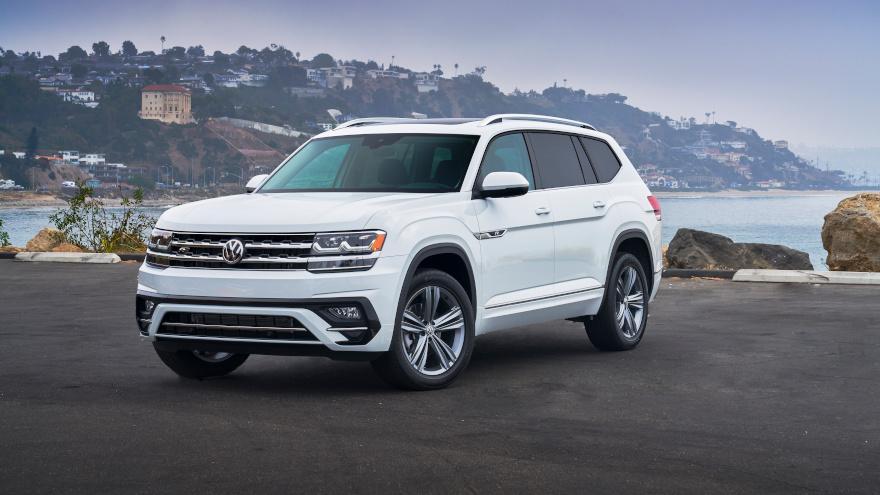J.P. Morgan to acquire majority stake of Volkswagen Payments

2020 Volkswagen Atlas. Photo courtesy of Volkswagen.
By subscribing, you agree to receive communications from Auto Remarketing and our partners in accordance with our Privacy Policy. We may share your information with select partners and sponsors who may contact you about their products and services. You may unsubscribe at any time.
LONDON –
J.P. Morgan recognizes that modern vehicles do more than travel highways, taking their owners from place to place. These vehicles also can be the conduit to a variety of financial transactions, too.
On Wednesday, J.P. Morgan’s corporate and investment bank announced that it has entered into a strategic deal with Volkswagen Financial Services, with plans to acquire a controlling interest of close to 75% in the OEM’s payments platform, operated by Volkswagen Payments.
The bank highlighted that the deal, which is subject to regulatory approvals, will expand the J.P. Morgan’s digital payment capabilities and see the platform extended and accessible to the broader auto industry.
According to a news release, the alliance between the two firms will seek to develop the platform for new markets and industries outside of the automotive sector where mobility-focused payments will become central.
The deal is expected to close in the first half of 2022, at which point the two companies will build out their joint operating model — including branding of the initiative — with a strategy to open to other companies across the auto industry.
Executives indicated Volkswagen Financial Services will remain a shareholder and the platform will continue to facilitate payments across the Volkswagen network in support of all Volkswagen Group brands globally.
Subscribe to Auto Remarketing to stay informed and stay ahead.
By subscribing, you agree to receive communications from Auto Remarketing and our partners in accordance with our Privacy Policy. We may share your information with select partners and sponsors who may contact you about their products and services. You may unsubscribe at any time.
Founded in 2017 in Luxembourg, Volkswagen Payments operates a leading payments platform designed for the auto industry. Operating in 32 markets around the world, the business offers a range of digital payments services across the auto ecosystem, including:
— Initial purchase and leasing
— In-vehicle payments
— Fueling and electric vehicle charging
— Parking and subscription-based services such as insurance and in-vehicle entertainment.
The companies pointed out the payments solution focuses on digitally connecting the auto ecosystem and improving the payments experience for consumers, distributors and suppliers alike.
J.P. Morgan described the platform as a “natural fit” for its wholesale payments business, which combines corporate treasury services, trade finance, card and merchant services capabilities. The business also looks to deliver an integrated payments experience to end users across the economy.
Executives mentioned that Volkswagen Payments will continue to be based in Luxembourg, which is one of J.P. Morgan’s key European locations and where it has a proud history of supporting clients for more than 45 years.
J.P. Morgan projects that in-car payments could reach $4 billion this year. J.P. Morgan also expects that the connected vehicle, the digital payments experience and customized payment services, will all become core features of business models in the future.
“We plan to build on Volkswagen Financial Services’ innovative groundwork on the existing platform and apply the global scale of our payments expertise to meet evolving customer expectations in the auto space and beyond,” said Shahrokh Moinian, head of wholesale payments at J.P. Morgan
Max Neukirchen, global head of merchant services at J.P. Morgan, added these thoughts in the news release: “Auto payments encapsulate many of the characteristics of the wallet of the future more generally. Partnering with a leader in the field gives us a great opportunity to be at the heart of that.”
Christian Dahlheim, head of Volkswagen Group Sales, also discussed why the OEM made this move with J.P. Morgan.
“With its many years of banking experience and global market presence, J.P. Morgan is the ideal partner for Volkswagen Payments to implement the requirements of the Volkswagen Group’s brands for customized automotive payment solutions worldwide,” Dahlheim said in the news release.
And Volkswagen Financial Services chief information officer Mario Daberkow added, “We are proud of the successful setup and operation of Volkswagen Payments and, as a strong shareholder, we will ensure that it continues to support the Volkswagen Group and its brands with tailor-made and innovative solutions and services in the field of digital payments.”


